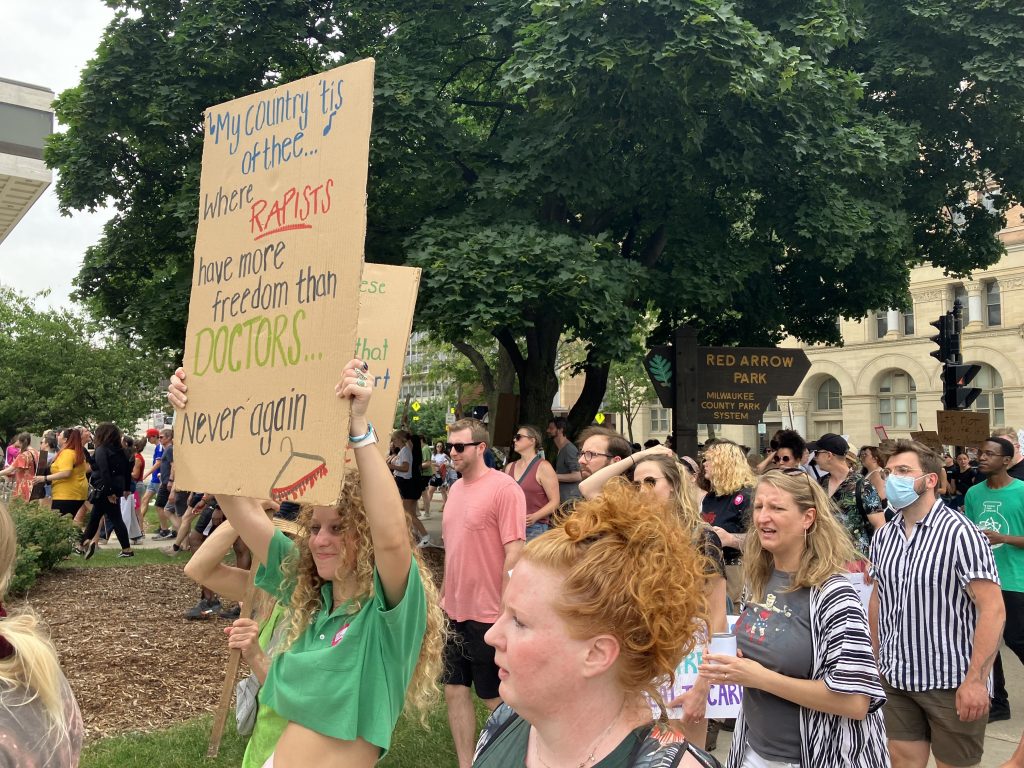Abortion Rights Backers Get Two Wins
'There is no such thing as an 1849 abortion ban in Wisconsin.'
Abortion-right advocates are about to get their second preliminary victory in a month when Milwaukee County Judge Janet Protasiewicz is sworn in as a Supreme Court justice.
Protasiewicz will begin her 10-year term on the court with a Capitol rotunda ceremony at 4:30 p.m. on Aug. 1. Before her April election over former Justice Daniel Kelly, Protasiewicz repeatedly said women should have a right to make their own health-care decisions, including about abortions.
Her investiture comes weeks after a July 7 ruling by Dane County Circuit Judge Diane Schlipper that was praised by abortion-rights advocates. Citing a 1994 state Supreme Court ruling, Schlipper said a law passed one year after Wisconsin became a state “says nothing about abortion—there is no such thing as an ‘1849 abortion ban’ in Wisconsin.”
The judge’s ruling was preliminary, because it dealt with a narrow question: Can the challenge to the 1849 law filed by Atty. Gen. Josh Kaul, at the behest of Gov. Tony Evers, proceed? Schlipper’s affirmative decision kept the case in her court.
The lawsuit was filed by Kaul and joined by doctors who say Wisconsin laws on abortion are unclear, since the U.S. Supreme Court last year overturned a national standard permitting abortions and instead gave each state authority to ban or allow the procedure.
Kaul sued Sheboygan County District Attorney Joel Urmanski who, citing the 1849 law, had threatened to prosecute medical professionals who perform abortions. Urmanski’s attorney asked that the suit be dismissed.
Schlipper’s final decision will be appealed and the question is expected to be ultimately decided by the state Supreme Court, where Evers and Kaul hope that Protasewicz joins a majority of the seven justices who restore the right of women to an abortion.
Although the Dane County judge’s ruling turned on a procedural question, Heather Weininger, executive director of Wisconsin Right to Life, called it a “devastating setback in our ongoing fight to protect Wisconsin’s preborn children… In the year since Roe v. Wade was overturned, we know that countless lives have been saved because of [the 1849 law].”
That law says “any person, other than the mother, who intentionally destroys the life of an unborn child” is guilty of a felony. The only exception is an abortion performed to save the woman’s life.
But Schlipper said that law applies only to someone who commits feticide, which is the intentional killing of a baby born alive. “The meaning of ‘feticide’ is not ambiguous – [the 1849 law] does not prohibit a consensual medical abortion,” she wrote.
Schlipper cited the precedent set in 1994, when the state Supreme Court upheld a feticide charge against a man who punched his pregnant wife twice in the stomach days before she was due to give birth. At a hospital, the woman’s full-term baby was dead.
Kaul acknowledged that decision doesn’t resolve the lawsuit, but insisted it was a “major victory in our fight to restore reproductive freedom in Wisconsin.” Evers called the decision “good news and a critical step in our fight to end our state’s criminal abortion ban and restore the reproductive freedom women had in Wisconsin” between 1973 and 2022.
Wisconsin has regulated abortion “since its founding,” noted Schlipper, who was elected in 2022.
Male legislators wrote and passed all abortion laws until 1920, when women won the right to vote. No women served in the Wisconsin Legislature until 1925.
A history of Wisconsin laws on abortion by the nonpartisan Legislative Reference Bureau (LRB) traced the origin of the 1849 law. “Lawmakers enacted a general prohibition on abortion after ‘quickening,’ providing an exception for an abortion necessary to preserve the life of the mother,” the LRB noted,
In last year’s U.S. Supreme Court ruling, justices said the first definition of “quickening” was “the first felt movement of the fetus in the womb, which usually occurs between the 16th and 18th week of pregnancy.”
Wisconsin’s first lawmakers probably copied Michigan laws, the LRB added. “This kind of textual appropriation was hardly unusual, as Michigan laws had formed the foundation of Wisconsin territorial laws.”
Schlipper noted that Wisconsin passed several laws regulating abortions after the U.S. Supreme Court’s 1973 decision established a constitutional right to the procedure. Those included rules about “gaining consent, performing an ultrasound, and special rules about abortions after a sexual assault,” she said.
Steven Walters started covering the Capitol in 1988. Contact him at stevenscotwalters@gmail.com
If you think stories like this are important, become a member of Urban Milwaukee and help support real, independent journalism. Plus you get some cool added benefits.
The State of Politics
-
A Wisconsin Political Trivia Quiz
 Dec 15th, 2025 by Steven Walters
Dec 15th, 2025 by Steven Walters
-
The Fight Over Wisconsin’s House Districts
 Dec 8th, 2025 by Steven Walters
Dec 8th, 2025 by Steven Walters
-
The Battle Over On-Line Betting
 Nov 24th, 2025 by Steven Walters
Nov 24th, 2025 by Steven Walters






















